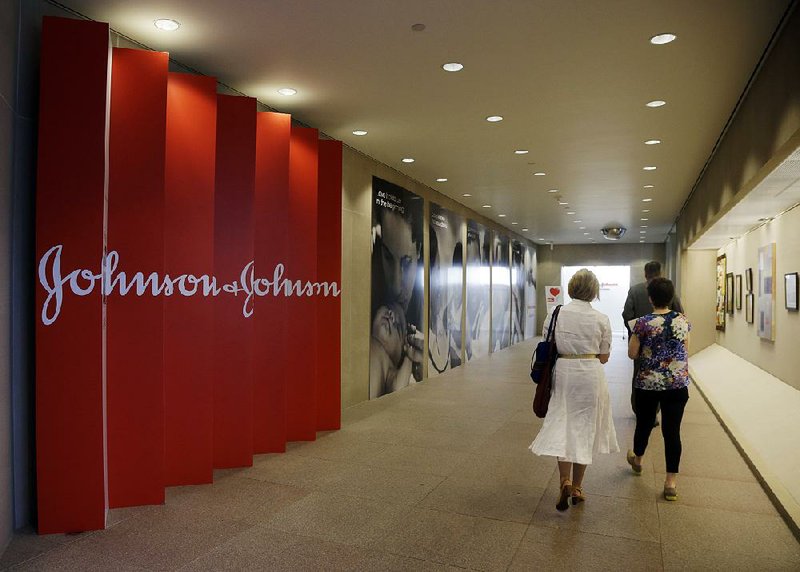Johnson & Johnson is recalling one lot of its Johnson's Baby Powder after tiny amounts of asbestos contamination were found in samples from a single bottle purchased online.
Johnson & Johnson is voluntarily recalling the lot, #22318RB, which consists of 33,000 bottles, and is encouraging people who bought the product to discontinue use. The company said that it is working with the Food and Drug Administration, which tested the bottle, and has started an investigation into how and when the product was contaminated.
FDA spokeswoman Gloria Sanchez-Contreras said the contaminated bottle contained chrysotile fibers, the most commonly used form of asbestos. The FDA recommended that consumers stop using the lot immediately and contact Johnson & Johnson for a refund.
Johnson & Johnson shares fell 6.2% to $127.72 Friday in New York trading. The stock has been under pressure as investors try to ascertain the company's potential liabilities in a series of lawsuits related to talc and other products.
"Thousands of tests over the past 40 years repeatedly confirm that our consumer talc products do not contain asbestos," Johnson & Johnson said in a statement on Friday.
Johnson & Johnson is looking into whether cross-contamination of the sample caused a false positive, whether the product was appropriately sealed and maintained in a controlled environment, and whether the product was a counterfeit.
Sanchez-Contreras said the FDA "stands by the quality of its testing and results and is not aware of any adverse events relating to exposure to the lot of affected products."
During a brief call with investors on Friday, Johnson & Johnson global supply chain and women's health executives said they had received the product's test results the previous day and acted promptly to inform the public. The investigation could take 30 days or more, they said. The executives didn't take questions from participants on the call.
LEGAL IMPLICATIONS
Chief Financial Officer Joseph Wolk said on a Tuesday conference call with investors that the company wouldn't set aside any legal reserves for the more than 100,000 lawsuits it faces across its portfolio of drugs, consumer products and medical devices, saying it expects to fight and win many of the claims.
"The management team here will look at what a reasonable outcome could be for all stakeholders involved," Wolk said. "When products are safe, when they're effective, we're going to look to make sure that those products aren't subject to what's become unfortunately a big business model for plaintiff's attorneys."
Johnson & Johnson has already settled some of the lawsuits in which plaintiffs claim they were given cancer by the talc-based personal care products, but 15,500 suits remain, according to a July filing with the U.S. Securities and Exchange Commission.
Company spokesman Ernie Knewitz declined to comment on the contamination beyond the news release and said he wouldn't speculate on what the development means for the litigation.
Baby powder-related liabilities could eventually cost the company as much as $10 billion, according to Bloomberg Intelligence. Though the product accounts for only a small fraction of Johnson & Johnson's annual revenue, it's been a core brand for the company for more than a century.
LONG-STANDING CLAIMS
Lawyers for women who blame their cancers on asbestos-tainted talc powder contend internal Johnson & Johnson documents indicated officials knew since the 1970s that powder mined in places such as Vermont and Italy contained trace amounts of asbestos, but failed to alert consumers or regulators. Asbestos is often found intertwined with talc.
"Had J&J acted responsibly and removed Johnson's Baby Powder from the market in the 1970s, they would have saved the lives of thousands of women who have died needlessly of ovarian cancer," Leigh O'Dell, an Alabama lawyer who is leading the plaintiffs' cases that have been consolidated before a federal judge in New Jersey for pretrial information exchanges, said on Friday.
Given that Johnson & Johnson's lawyers made public statements this month that the company's talc-based products were free of asbestos, the recall couldn't come at worse time, said Nora Engstrom, a Stanford University law professor. The company has vowed for years that extensive testing showed no traces of asbestos, she noted.
"The wisdom of J&J's broad defense strategy for these talc cases clearly is now in doubt," Engstrom said.
Johnson & Johnson has refuted and, in many cases, appealed verdicts against it, citing conflicting evidence on whether talcum powder can cause cancer. In a statement provided to Time magazine after the new study's publication, the company maintained that baby powder is safe.
"We sympathize with anyone suffering from cancer, and we understand patients and their families are seeking answers. The facts are clear -- Johnson's Baby Powder is safe, does not contain asbestos nor does it cause cancer, as reflected in more than 40 years of scientific evidence," the statement reads.
Johnson & Johnson said in February that it had received subpoenas and inquiries related to its baby-powder products from the U.S. Justice Department, the SEC and the top Democrat on the Senate Committee on Health, Education, Labor and Pensions. Knewitz, the Johnson & Johnson spokesman, said at the time the company would cooperate with the inquiries.
Bloomberg News reported in July that the Justice Department is pursuing a criminal investigation into whether Johnson & Johnson lied to the public about the possible cancer risks of its talc powder.
Business on 10/19/2019

